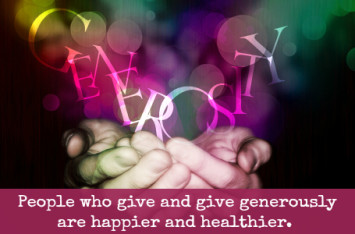Generosity is good for the soul. Now, you might merely think that is a spiritual lesson. But there is growing evidence that actually people who donate to charity are happier and healthier. That’s the conclusion of Arthur Brooks, president of the American Enterprise Institute.
I have quoted from him and his book, Who Really Cares? He wrote that many years ago when he was a professor at Syracuse University. He has continued to follow giving patterns and discovered even more about people who give and how it affects them in positive ways.
He and many others have documented that Americans are givers. Last year various non-profit charities and houses of worship received more than $316 billion. More than 70 percent of these voluntary gifts were donated by individuals and families. Americans give away more than the entire GDP of Israel and Denmark.
As you might predict, contributions increase as wealth and income increase. Giving also increases with age and education. Women give more than men. Married people give more than singles. Religious Americans give more than secularists.
We are also finding that giving and happiness are strongly correlated. But does giving cause happiness, or do happy people just give more? Giving brings happiness. One study concluded that “the amount subjects spend on themselves was inconsequential to happiness, while spending on others yielded significant happiness gains.”
Other studies show an improvement in health. One study found that “volunteering significantly lowers the association between stressful events and death.” Another study found that altruistic teenagers are physically and mentally healthier later in their lives than their less generous peers.” Yet another study found that dedicated volunteers live longer than those who do not volunteer their time.
Generosity is not only good for the soul. It turns out that it is good for your mental and physical well-being. People who give and give generously are happier and healthier.
 Listen Online
Listen Online Watch Online
Watch Online Find a Station in Your Area
Find a Station in Your Area












 Listen Now
Listen Now Watch Online
Watch Online
